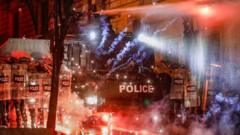With police employing water cannons and tear gas against demonstrators, and claims of brutality emerging from detained protesters, the atmosphere is charged. Political leaders from across the spectrum, including the frustrated opposition, vie for legitimacy, while accusations fly between the ruling party and the opposition over foreign influences and electoral fairness. Despite the potential for violence to escalate, the considerable public outcry demonstrates the depth of feeling surrounding Georgia’s future direction. As officials look on, the concern looms that a society teetering on the edge of crisis may soon face a choice that will define its identity for generations to come.
In the heart of Tbilisi, the protests have become emblematic of a wider confrontation over Georgia's national trajectory amid external pressures and competing ideological narratives. With the kingdom of public sentiment shaping perceptions of legitimacy, many fear that the escalating civil unrest may invite darker consequences, as history cautions against a seemingly straightforward choice in these turbulent times.
In the heart of Tbilisi, the protests have become emblematic of a wider confrontation over Georgia's national trajectory amid external pressures and competing ideological narratives. With the kingdom of public sentiment shaping perceptions of legitimacy, many fear that the escalating civil unrest may invite darker consequences, as history cautions against a seemingly straightforward choice in these turbulent times.






















